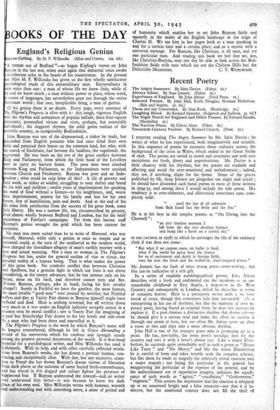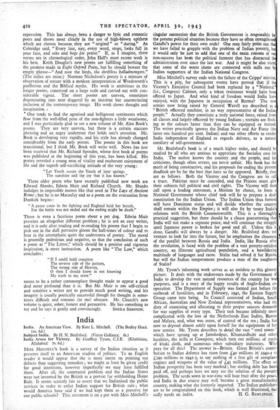Recent Poetry
The Angry Summer. By Idris Davies. (Faber. 6s.) Always Adam. By Sean Jennett. (Faber. 6s.) Experience of England. By John Atkins. (Favil Press. Is.)
Selected Poems. By John Hall, Keith Douglas, Norman Nicholson.. (Bale and Staples. 2S. 6d.) These are my Comrades. By Alan Rook. (Routledge. .55.) Laughing Blood. By Richard Spender. (Sidgwick and Jackson. 49. 6d.j The Night Watch for England and Other Poems. By Edward Shanks.
(Macmillan. 5s.) The Narrow Place. By Edwin Muir. (Faber. 6s.) Twentieth Century Psalter. By Richard Church. (Dent. 5s.)
I ENJOYED reading The Angry Summer by Mr. Idris Davies ; he writes of what he has experienced, both imaginatively and actually. In this sequence of poems he recreates those ordinary scenes, the background of the crisis in Wales, which ended in the Great Strike of 1926. The poems are varied in mood and treatment and with rare exceptions are fresh, direct and unpretentious. Mr. Davies is a little chancey with his rhythms, but the poems are readable and affecting and avoid the over-emotional and melodramatic ; indeed, they are, if anything, slight for the theme. Some of the pieces published by Mr. Sean Jennett are altogether too slight and trivial ; he should have discarded such banal poems as most of those written in '934-35, and among these I would include the title poem. His tendency is to over-elaborate, and alliteration sometimes runs com- pletely wild: " . . until the last of all subtracts from flesh fused fast the fettle and the fire."
He is at his best in the simpler poems, as " On Diving into the
Cherwell": "an airy timeless moment I
full from the day into absolute balance
and hung like a hawk on a crystal sky."
or one (written in 1938) in which he envisages the life of the ordinary clerk if war does not come:
"But what if no cannon roars, no bullet is fired, what if the world for peace loses the chance
for us of excitement and death in foreign fields,
ours for ever the brick and the walled-in, short-stopped glance."
Mr. Jennett has the fault of most young poets—over-writMg : but this can be indicative of a rich gift.
In a series of readable autobiographical poems, Johii Atkins describes with a fresh and undimmed eye the incidents of an un- remarkable childhood in East Anglia, a migration to the West Country and subsequently to London, which he describes in terms of romantic horror. Here is a perceptive writer with a we '-omc streak of irony, though this sometimes fails him lamentably ! C is enterprising in his use of rhythms, but like the majority of cont m- porary poets, having found an original form, he does not thoroti-Aly explore it. If a poet chooses a distinctive rhythm and rhyme .'cb'me he should give it a serious trial and make the ((fort to sustain it through one poem at least, but too often Mr. Atkins gives up after a verse or two and slips into a more obvious rhythm.
John Hall is one of the younger poets who is promising up to a point. He has, inevitably, the town poet's nostalgic love for the country and sees it with a lover's absent eye. Like a minor Eliza- bethan, he succeeds quite remarkably well in such a poem as "Hours Like Tears " and "No Mercy," and like the minor Elizabethan he is careful of form and takes trouble with the complex scheme, but like them he tends to magnify the relatively trivial emotion into a major tragedy ; not losing the particular in the general but exaggerating the particular at the expense of the general, and by the indiscriminate use of superlative imagery, exhausts the signi& cance of such words as " agony," " crucifixion," " Gethsemane," "stigmata." This creates the impression that the emotion is whipped up to an unnatural height and a false intensity—not that it is in- sincere, but the _emotional content does not fill the shell of expression. This has always been a danger to lyric and romantic poets and shows most clearly in the use of high-blown epithets which are chosen because; they are " original" or " daring." As Coleridge said, " Every line, nay, every word, stops, looks full in your face, and asks and begs for praise." If, as I imagine, these verses are in chronological order, John Hall's most recent work is his best. Keith Douglas's new poems are fulfilling something of the promise made in Eight Oxford Poets, but he should beware the empty phrase—" And now the birds, the thriftless balladmongers." (The italics are mine.) Norman Nicholson's poetry is a mixture of observation of nature with a modem interpretation of Wordsworth's panTheism and the Biblical myths. His work is ambitious in the longer poems, conceived on a large scale and carried out with con- siderable vigour. The short poems are uneven, sometimes degenerating into near doggerel by an insistent but unconvincing inclusion of the contemporary image. His work shows thought and imagination..
One tends to find the agonised and belligerent sentiments which flow from the well-filled pens of the non-fighters a little wearisome, and I was particularly glad to see a new volume of Mr. Alan Rook's poems. They are very uneven, but there is a certain staccato phrasing and an angry undertone that holds one's attention. Mr. Rook is developing very rapidly, and his style has already changed considerably from the early poems. The poems in this book are transitional, but I think Mr. Rook will write well. News has just been received that Mr. Richard Spender, whose first book of poems was published at the beginning of this year, has been killed. His poetry revealed a young man of vitality and exuberant enjoyment of life and the superb self-sacrificing attitude of the very young:
"Let Youth assure the Youth of later springs
The sunshine and thp joy that it has known."
Three older poets who have recently published new work are Edward Shanks, Edwin Muir and Richard Church. Mr. Shanks indulges in impossible metres like that used in The Lays of Ancient Rome ; but he is no Macaulay and so a poem on the evacuation from Dunkirk begins :
" A pause came in the fighting and England held her breath, For the battle was not ended and the ending might be death."
There is even a facetious poem about a pet dog. Edwin Muir presents an altogether different problem ; he is not an easy writer, and it is only after reading and re-reading his poems that I begin to pick out in the dull pervasive gloom the half-tones 'of colour and to hear in the unemphatic quiet the undertones of poetry. The mood is generally pedestrian and negative, so that the conclusion of such a poem as " The Letter," which should be a positive and vigorous inspiration, is mere instruction. A poem like "The Law," which concludes:
" If I could hold complete The reverse side of the pattern, The wrong side of Heaven, 0 then I should know in not knowing My truth in my error."
seems to be a rather commonplace thought made to appear a good deal more profound than it is. But Mr. Muir is too self-critical and sensitive a writer not to provide much good writing, and his imagery is usually poetically successful though his thought is some- times difficult and remains (to me) obscure. Mr. Church's new volume is quiet, sober, honest and persuasive. He has something to
say and he says it gently and convincingly. SHEILA SHANNON.























 Previous page
Previous page